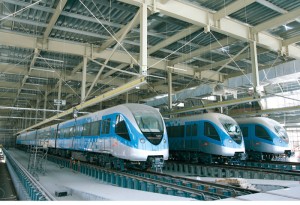By MEP Middle East www.arabianbusiness.com
Al-Futtaim Engineering MEP division general manager SS Murali looks back on some of the MEP works involved at the Dubai Metro depots.

From the outset, Murali is full of praise for the overarching vision of His Highness Sheikh Mohammed bin Rashid Al Maktoum, Vice President and Prime Minister of the UAE and Ruler of Dubai. “Al-Futtaim Engineering is proud to have been part of this state-of-the-art railway system. The team behind the Dubai Metro reflects the emirate’s truly international character and ability to benchmark itself against global standards.”
The main contractor was the JTM joint venture, comprising Obayashi/Kajima from Japan and Yapi Merkazi from Turkey. “Al-Futtaim Engineering was awarded the contract to be the MEP contractor for the main depot at Rashidiya, with an auxiliary depot located at Jebel Ali Port. We have been involved with several large-scale projects before, but the Dubai Metro depots have been unique,” comments Murali, who joined Al-Futtaim in 1998 from India, and has seen Al-Futtaim Engineering’s MEP business grow significantly in the last few years.
Red Line depots
“The Red Line depots are basically places where you have sidings and cleaning buildings, light rail workshops, a diesel engine workshop, vehicle maintenance store, train wash and other buildings. Our scope of work covered included air-conditioning, smoke ventilation, general air extraction, fire protection and alarm systems, standalone emergency exit systems and a well-engineered electrical distribution system with complete back-up. We used TREND building management systems from the UK, for which Al-Futtaim Engineering is the local agent,” explains Murali.
“The knowledge and experience gained from this project will serve us well in handling other complicated projects in the future. The general approach we take with any project is not only a fully contractual role, but also engineering per se. We are practicing engineers, and hence like to work with the main contractor and client to arrive at an optimal solution.”
Murali is also full of praise for the leadership provided by the chairman of the board and executive director of the Roads and Transport Authority (RTA), Mattar Al Tayer, CEO Abdul Majed Al Khaja and construction director Adnan Hammadi, who were all instrumental in achieving the Dubai Metro’s 09-09-09 goal. “The Dubai Metro project was completed in record-breaking time – less than four years since HH Sheikh Mohammed laid the foundation on 21 March 2006,” notes Murali.
Safety standards
“Throughout the construction, RTA remained highly committed to the best global safety standards and using the latest technology available in the rail industry, so as to cater for the maximum comfort and safety of all passengers. RTA’s constant motivation and direction was vital in helping us meet the challenging deadlines.
“We had to interface with various companies in terms of specifications, drawings, documentation and obtaining approvals. The MEP industry in the UAE works largely on British, European and US standards, so we had no problem in co-operating in an international venture of this nature and size.”
Lessons learnt revolved around:
• Interface and coordination with various agencies from around the world. The focus and attention to detail of the vast international team helped in achieving a good quality installation. Systra Parsons was the engineer, while the designs were produced by Atkins;
• The rail network uses 750 V DC power. In all the tracks that were energised with 750 V DC power, rigorous safety measures as advised by the DURL consortium were implemented so as to mitigate accidents. This meant rigorous three-day training for all operatives and smarter/efficient utilisation of available resources and work fronts to achieve project timelines; and • Key milestone dates met: any slippage in the timeframe meant far greater difficulties in getting the work completed, as other agencies would step in to work in the same area.
The Al-Futtaim Engineering MEP division has 150 professionals and about 1500 to 1800 site operators. It is divided into three distinct units, namely projects, maintenance and low-current systems.
“My team worked 24/7 to have the required sections of the project delivered so as to commence operations on schedule.” Murali reveals that the company is continuing with the other sections of the project, including the Green Line depots, under the guidance of the RTA/JTM JV.1.
The Dubai Metro is the world’s first district-cooled mass transit system, says Stanley Consultants project manager Hisham Hajaj.
A world-class distribution network provides centralised cooling via pre-insulated buried steel piping to all Dubai Metro stations. Five district cooling plants were built:
• Al Rigga: 10 000 TR
• Al Barsha: 7 500 TR
• Jumeirah Island: 7 000 TR
• Jebel Ali Industrial: 4 400 TR
• Al Rashidiya: 7 500 TR
Hajaj cites the design challenges as having to reroute existing utilities, the lack of ‘as built’ documentation, unmarked utilities, and the lack of space in some areas for chilled-water piping (52 km of piping was needed.)
Not only did district cooling reduce the electromechanical areas inside the stations, but it also reduced the total power use by between 30% to 50%. This, in turn, reduced the total carbon footprint and noise and vibration, as opposed to the alternate standalone solution of having roof-top air-cooled chillers and pumps.
“The initial cost of the district cooling solution is higher, but payback is shorter. Its lifespan is also 25 years as opposed to 15 years for an air-cooled solution,” cites Hajaj.



















